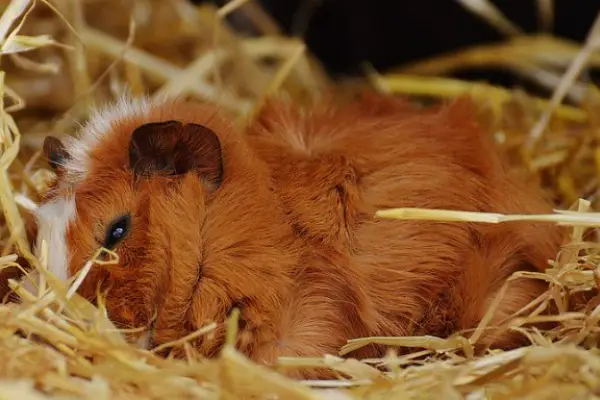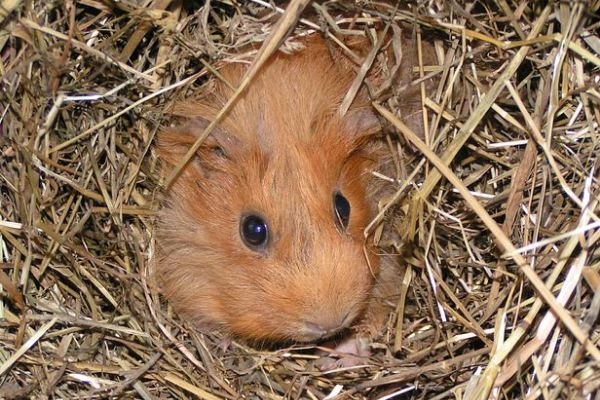Can Guinea Pigs Eat Tangerines [How To Feed]
![Can Guinea Pigs Eat Tangerines [How To Feed] Can Guinea Pigs Eat Tangerines](https://petcreeks.com/wp-content/uploads/2022/04/Can-Guinea-Pigs-Eat-Tangerines.jpg)
Are you a proud guinea pig parent? If so, you’re probably always on the lookout for safe and healthy snacks to give your furry friends.
You may be wondering, can guinea pigs eat tangerines? Well, we’ve got good news for you!
Tangerines are not only safe for guinea pigs to eat, but they are also a great source of vitamin C.
Read on to learn more about this tasty treat for your beloved pets.
Can Guinea Pigs Eat Tangerines
Yes, guinea pigs can eat tangerines, but it’s important to feed them in moderation.
Tangerines, like other citrus fruits, are high in sugar and acid, which can be harmful to guinea pigs if consumed in large quantities.
However, they are also a good source of vitamin C, which is an essential nutrient for guinea pigs.
It’s recommended to only give them a small serving of tangerines occasionally as a treat.
Additionally, make sure to remove any seeds or pits before feeding them to your guinea pig.
How to Feed Tangerines to Your Guinea Pigs
Here is a step-by-step process for feeding tangerines to guinea pigs:
- Choose a fresh tangerine that is ripe and free of any mold or other signs of spoilage.
- Wash the tangerine thoroughly under running water to remove any dirt or pesticides.
- Cut the tangerine into small pieces that are easy for your guinea pig to eat.
- Offer tangerine to your guinea pig as a treat in addition to their regular diet, such as hay and pellets.
- Watch your guinea pig for any signs of digestive upset, such as diarrhea or decreased appetite. If you notice any of these signs, stop feeding tangerines and consult with a veterinarian.
- After a few hours, take any tangerines that haven’t been consumed out of your guinea pig’s cage to keep it from deteriorating and luring pests.
It’s important to note that tangerines, like other fruits, should be fed to guinea pigs in moderation as they are high in sugar.
A guinea pig’s diet should consist mainly of hay and fresh vegetables, with fruits offered as occasional treats.
Precautions to take when feeding tangerines to Guinea Pigs
Here are a few precautions to keep in mind:
- Wash the fruit: Before feeding tangerines to your guinea pig, make sure to wash them thoroughly with water to remove any pesticides or dirt that may be present.
- Limit the Quantity: Tangerines are high in sugar, so should be fed in moderation. Feeding small bite-sized pieces with seeds removed, a few times a week is acceptable and adequate for guinea pigs.
- Avoid Feeding Whole Fruits: It is important to never feed the entire fruit to your guinea pig. The peel and the seeds can cause digestive issues such as choking or gastrointestinal blockages. So it is crucial to remove the peel and seeds before feeding tangerines to them.
- Introduce slowly: When introducing new foods to your guinea pig, it’s important to do so slowly and in small amounts to prevent digestive upset.
- Watch for Side Effects: Some guinea pigs may be more sensitive than others to certain fruits. If you notice any stomach upset, diarrhea, or a sudden lack of appetite after feeding tangerines, stop giving them and check with a vet.
Different ways of incorporating grapes into the guinea pig diet
Here are different ways to incorporate tangerines into a guinea pig’s diet:
- Offer tangerine slices as a treat: Tangerine slices are a tasty treat that is also nutritious for guinea pigs. Just slice some up and give them to your guinea pig as a treat.
- Mix tangerines into their regular food: You may add a tiny quantity of sliced tangerine for taste and nutrients if your guinea pig prefers eating pellets or other commercial diets.
- Create a tangerine salad: For a nice and nourishing salad, finely chop some fresh greens like romaine lettuce or spinach and combine them with some diced tangerine.
- Make a tangerine smoothie: For a cool beverage that your guinea pig is sure to appreciate, blend some fresh tangerine segments with water and a tiny quantity of honey or another sweetener.
- Freeze tangerine slices for a cool treat: Tangerine slices may be frozen and given to your guinea pig as a cold, refreshing treat during hot weather. Be sure to take out any seeds before freezing, though.
Potential Benefits of Feeding Tangerines to Guinea Pigs
Here are some potential benefits of feeding tangerines to guinea pigs:
- Vitamin C: Tangerines are a good source of vitamin C, which is an essential nutrient for guinea pigs. Guinea pigs cannot synthesize their own vitamin C and need to obtain it from their diet. Vitamin C plays a crucial role in maintaining guinea pigs’ overall health and preventing scurvy.
- Fiber: Tangerines also contain fiber, which can help regulate guinea pigs’ digestion and prevent digestive issues like constipation.
- Hydration: Tangerines are a source of water, which is important for keeping guinea pigs hydrated.
- Antioxidants: Tangerines contain antioxidants that can help protect guinea pigs from harmful free radicals and promote overall health.
- Flavor: Tangerines have a sweet, tangy flavor that some guinea pigs may enjoy as a treat.
- Entertainment: Offering guinea pigs small portions of tangerines can provide them with a fun and stimulating way to interact with their food.
- Variety: Adding tangerines to a guinea pig’s diet can provide variety and enrichment, which can help prevent boredom and keep guinea pigs mentally stimulated.
- Vitamin A: Tangerines also contain vitamin A, which is important for maintaining healthy skin, coat, and eyesight in guinea pigs.
- Minerals: Tangerines contain minerals such as potassium and calcium which are important for maintaining guinea pigs’ overall health.
Potential health risks of feeding tangerines to Guinea Pigs
Here are some potential health risks of feeding tangerines to guinea pigs:
- Acidic pee: Tangerines’ strong acid content can make guinea pig urine more acidic. Urinary tract infections and bladder issues may result from this.
- Allergic reactions: An allergic reaction to tangerines may occur in certain guinea pigs, which may result in symptoms including itching, rashes, or even anaphylaxis.
- Choking hazard: Tangerine seeds are a potential choking hazard for guinea pigs. It’s advisable to get rid of them before giving your pet any tangerines.
- Vitamin C overdose: An excessive amount of vitamin C is present in tangerines, despite the fact that guinea pigs need a diet high in this vitamin. They may have an overdose from eating too many tangerines, which can result in diarrhea, kidney stones, or bladder stones.
- Digestive issues: Guinea pigs may experience digestive troubles as a result of the high sugar and acid content of tangerines. Tangerines can cause diarrhea, bloating, and stomach distress if consumed in excess.
- Teeth decay: Tangerines’ high sugar content can potentially give guinea pigs dental issues. Sugar can adhere to their teeth and eventually lead to decay or cavities.
- Obesity: Tangerines are abundant in natural sugars, which when consumed in big quantities by guinea pigs, can quickly accumulate and cause obesity.
Other safe fruits and veggies for guinea pigs:
Related questions
Are there any health benefits of feeding tangerines to guinea pigs?
Tangerines are a good source of vitamin C, which is an essential nutrient for guinea pigs to maintain their health.
However, guinea pigs are capable of producing their own vitamin C, so it is important not to over-supplement with fruits like tangerines.
Can tangerines be harmful to guinea pigs?
Tangerines can be harmful to guinea pigs if they are given in excessive amounts.
Too much citrus fruit can cause digestive problems, such as diarrhea, in guinea pigs.
Additionally, the high sugar content in tangerines can also lead to obesity if given too frequently or in large quantities.
How often can I feed tangerines to my guinea pig?
Tangerines should only be given to guinea pigs occasionally and in small amounts.
Once or twice a week is generally a safe frequency to offer tangerines to guinea pigs.
Do I need to prepare tangerines before giving them to my guinea pig?
Yes, it is important to wash the tangerine thoroughly before giving it to your guinea pig.
You should also remove any seeds or pits and cut the tangerine into small, bite-sized pieces to make it easier for your guinea pig to eat.
Can I give other citrus fruits to my guinea pig besides tangerines?
While tangerines are safe for guinea pigs to eat in moderation, other citrus fruits like lemons should be avoided as they are too acidic and can cause mouth sores or other digestive problems in guinea pigs.
Conclusion
In conclusion, guinea pigs can eat tangerines, but only in moderation. While they are a great source of vitamin C, too much citrus can cause digestive issues.
As with any new food, it’s important to introduce it slowly and monitor your furry friend’s reaction.
With proper care and attention, your guinea pig can enjoy a varied and healthy diet that includes a tasty treat like tangerines!

![Can Guinea Pigs Eat Oranges [How To Feed] Can Guinea Pigs Eat Oranges](https://petcreeks.com/wp-content/uploads/2022/04/Can-Guinea-Pigs-Eat-Oranges-768x614.jpg)
![Can Guinea Pigs Eat Cucumber [Pros & Cons] Can Guinea Pigs Eat Cucumber](https://petcreeks.com/wp-content/uploads/2022/04/Can-Guinea-Pigs-Eat-Cucumber-768x614.jpg)
![Can Guinea Pigs Eat Lettuce [Benefits & Risks] Can Guinea Pigs Eat Lettuce](https://petcreeks.com/wp-content/uploads/2022/04/Can-Guinea-Pigs-Eat-Lettuce-768x614.jpg)

![Can Guinea Pigs Eat Tomatoes [Pros & Cons] can guinea pigs eat tomatoes](https://petcreeks.com/wp-content/uploads/2022/04/can-guinea-pigs-eat-tomatoes.jpg)
